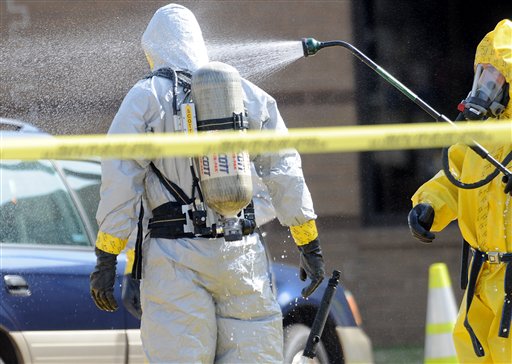
At least a dozen more suspicious letters turned up Wednesday at
financial institutions nationwide, but all appear to be harmless,
the FBI said.
At least a dozen more suspicious letters turned up Wednesday at financial institutions nationwide, but all appear to be harmless, the FBI said.
The U.S. Postal Service offered a reward of up to $100,000 for help in arresting those who mailed a total of about 50 threatening letters over the last several days to Chase Bank branches and federal regulatory offices in 11 cities.
Some of the letters were filled with white powder that has so far tested negative for poisonous or otherwise dangerous toxins, FBI spokesman Richard Kolko said in Washington.
Two of the letters turned up at separate JPMorgan Chase branches in the Columbus suburb of Grove City – one on Tuesday, the other Wednesday, FBI spokesman Mike Brooks said.
An FBI spokesman in Oklahoma, where eight letters turned up, said local preliminary assessments showed the powder was harmless calcium powder.
The letters were mailed to banks and financial institutions in and around Atlanta, Chicago, Columbus, Ohio, Dallas, Denver, Newark, N.J., New York City, Oklahoma City, Phoenix, San Francisco and Arlington, Va.
The letters first began surfacing Monday, forcing some bank branches to close. No injuries were reported, but some Chase employees, including a pregnant woman, were examined as a precaution. Chase branches around the country “are on alert,” said JPMorgan Chase spokesman Greg Hassell.
Authorities said the letters appear to be from the same source, and were focusing on possible suspects near Amarillo, Texas, where the envelopes were postmarked.
The incident was being investigated as a possible first, if extreme, public backlash over the nation’s financial crisis.
Meanwhile, the New York Police Department was investigating another letter containing suspicious white powder that was sent to The New York Times. The newspaper’s offices in midtown Manhattan remained open Wednesday.
A law enforcement official said the letter sent to the Times does not appear to be related to those sent to the financial institutions. The Times letter was not postmarked from Texas and contains a different substance than that in the bank letters, said the official, who spoke on condition of anonymity because he was not authorized to speak publicly about the case.
The Times letter also tested negative for dangerous toxins, the official said.








